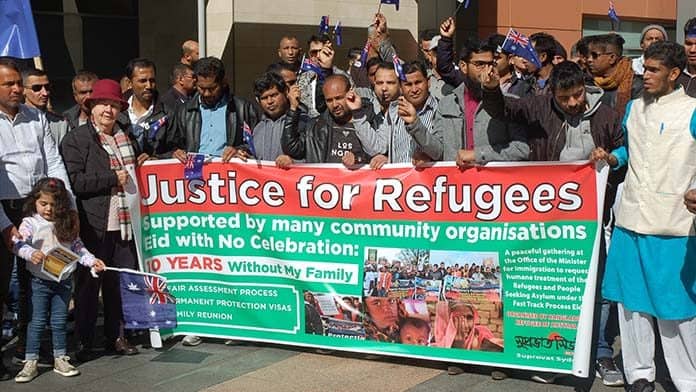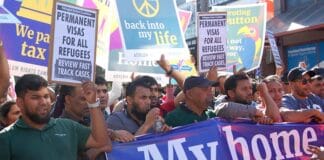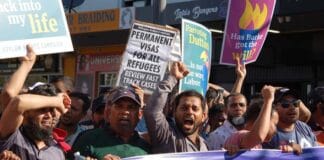Frustrated and desperate after six years in Australia, refugees on temporary visas have gathered to protest the denial of rights due to the government’s removal of permanent protection visas.
Around 1000 refugees and asylum seekers from around Australia travelled to Canberra on 5 August, with several hundred staging another protest in Sydney the following week.
The most any of the 30,000 refugees who arrived by boat after 13 August 2012 can get is a Temporary Protection Visa (TPV) or a Safe Haven Enterprise Visa (SHEV). This means they are denied the right to bring partners or children to join them, and must re-apply after three or four years when their visa expires. If they cannot prove they still require protection as a refugee, they face being sent back.
“When I left from Bangladesh I left my daughter who was five years old and I left my wife. Six years is too long without my family, many of us have this problem,” one told the rally.
The re-election of the Coalition government means they face at least another three years before any will receive permanent residency and be able to apply for family reunion. Labor remains committed to abolishing TPVs and SHEVs.
The protests are the largest refugee-organised demonstrations in years, uniting refugees and asylum seekers from across the Iraqi, Afghan, Sudanese, Bangladeshi, Rohingya and many other communities.
Life on a temporary visa means refugees live with continuing uncertainty. And the “Fast Track” changes the Liberals introduced in 2014 also means more and more asylum seekers have been refused refugee status.
“People who got rejected through this unfair process, they have to leave Australia. They are victims as well of this unfair policy,” Kaib, an Iraqi refugee, said. Rusul, who grew up in Iraq, explained that, “I’m married to an Iraqi refugee who has been here for six years now and was found to be a genuine refugee and is on a SHEV visa. We have a baby daughter, but I don’t know how to plan for our future because we don’t know if he’s going to be staying her permanently.
“Some of the refugees haven’t seen their families for eight years. I really hope the government listens and grants everyone permanent residency. They’ve suffered enough.”
By James Supple






